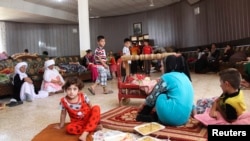With Islamist militants sweeping through northern Iraq and driving out Christians and other minorities, Obama administration officials say the president is considering direct military action that could include air strikes and humanitarian drops.
President Barack Obama met with members of his security team Thursday as the situation for tens of thousands of Christians and Yazidis grows more dire by the hour.
White House spokesman Josh Earnest condemned the militants for targeting minorities, including thousands of Yazidis who are stranded on a mountain with no food or water and surrounded by militant forces. Earnest said the situation is nearing a humanitarian catastrophe.
“We are seeing Christians be persecuted. We are seeing these other religious and ethnic minorities be persecuted just because of their identities. That is barbaric. It's disgusting, and it's something that we're deeply concerned about and very closely monitoring," said Earnest.
But beyond the harsh words, the White House had no announcement of what it planned to do in the coming hours.
White House officials made clear the president is not rushing into any decision to use military force in Iraq, saying there are no American military solutions to the problems in the country.
At the same time, Earnest said President Obama is not ruling out any action.
"The president has also been clear that any sort of military action that would be taken in Iraq would be very limited in scope and very specific to addressing a core American objective," he said.
A Pentagon official says the United States has begun an effort to deliver emergency humanitarian aid to Iraqi Christians and Yazidis facing death at the hands of Islamic extremists in northern Iraq.
The official says U.S. personnel in the region are getting ready to air drop food, water and other essential supplies. He says airstrikes "remain an option" to protect assets and diplomatic and military personnel in Irbil, where the United States has a consulate.
The mission of hundreds of U.S. troops who have been ordered to Iraq recently has been to safeguard American interests, including protecting the American embassy, and assessing the capabilities of Iraqi forces to fight militants with the Islamic State in Iraq and the Levant, or ISIL. The U.S. has stationed in the Persian Gulf an aircraft carrier, Navy ships armed with missiles and 1,000 Marines.
Earnest said any military action that the president might order would be contingent on political reforms that the administration has been pushing Iraqi leaders to make.
“The dire humanitarian situation that exists on Sinjar mountain is a consequence of a broader failure by Iraq's political leadership to pursue the kind of inclusive governing agenda that would unite that country to confront the threat that's posed by ISIL," he said.
The administration faced questions on whether those reforms might happen when it is too late to save the thousands of Christians, Yazidis and other Iraqi minorities from possible slaughter by the militants.




